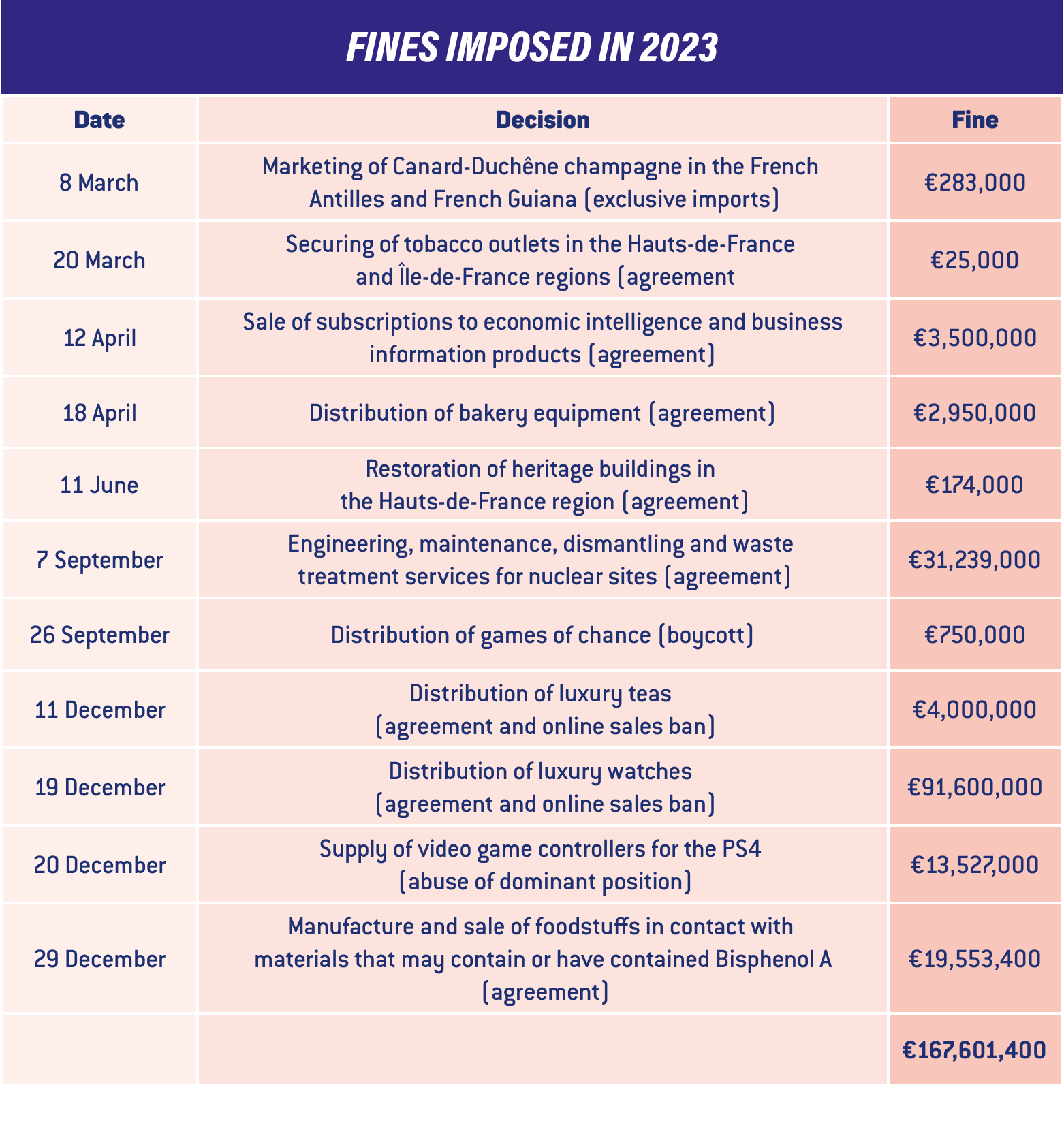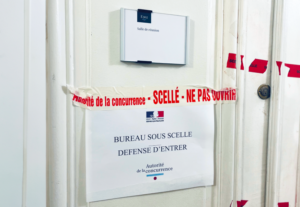ENFORCEMENT ACTION
Combating economic doping

In addition to tackling anticompetitive practices, the Autorité plays a more general role as a referee, ensuring that order and the rules of the game are scrupulously followed by seeking to prevent players from being unduly restricted in their movements, avoid any cheating and preserve fair play in the economic playing field. In competition, as in sport, it’s a good game when the teams play fairly!
A high-performance framework
A number of practices sanctioned
The negative impact on the economy of anticompetitive practices, specifically cartels and abuses of dominant position, is considerable, especially on the weakest. These practices can seriously damage the interests of consumers and SMEs, particularly when they lead to an artificial increase in prices or the limitation of supply on the market, and consequently remove the pressure on companies to innovate. Ultimately, this behaviour is detrimental to purchasing power, competitiveness, growth and employment.
2023 was an active year, during which the Autorité fined 11 anticompetitive practices in a variety of sectors (food, services, luxury goods, nuclear waste, construction and public works, etc.).

16
decisions on anticompetitive practices, including 11 fines.
Several dawn raids conducted
Effective control requires effective detection and available evidence. For this purpose, the Autorité has a dedicated service with cutting-edge IT investigative skills and high-performance equipment.
In 2023, the Investigation Services conducted dawn raids on companies suspected of anticompetitive practices in the following sectors:
- production and marketing of food and non-food products;
- graphics cards;
- passenger rail transport, distribution of travel agency services and products, and digital mobility systems and tools.
In 2024, the Investigation Services also conducted dawn raids on companies in the electrical cable distribution sector in the French overseas territories, and in the medical biology sector.
The cases are ongoing.
FOCUS ON…
E-commerce restrictions
E-commerce continues to grow and is now a major distribution channel. For a manufacturer, preventing its authorised retailers from selling on the Internet is strictly prohibited, since this type of practice is likely to restrict the development of distributors’ businesses and is detrimental to consumers, who could have enjoyed better prices. The Autorité is regularly required to sanction this type of behaviour and has recently fined several brands, once again recalling the rules in this area.
The Autorité fined Rolex €91 million for prohibiting its retailers from selling its watches via the Internet for over 10 years. It considered that the objective of combating counterfeiting and parallel trade invoked by Rolex could be achieved by means that are less restrictive to competition.
Decision 23-D-13 of 19 December 2023
Similarly, the Autorité imposed a €4 million fine on the Mariage Frères group – one of France’s leading producers of premium teas – for hindering the commercial freedom of its distributors for almost 15 years by prohibiting them from selling its branded products online, on the one hand, and reselling its products to other retailers, on the other. These practices limited intra-brand competition and partitioned markets.
Decision 23-D-12 of 11 December 2023
Following a report by the Directorate General for Competition Policy, Consumer Affairs and Fraud Control (DGCCRF), the Autorité also fined De Neuville more than €4 million for restricting the online selling of De Neuville brand chocolates by its franchisees. From 2006 to 2019, the contractual framework between the franchisor and its franchisees prevented the latter from freely selling their products online, with De Neuville reserving exclusive rights to online sales.
A new, effective detection framework
2023 also saw the leniency notice updated, plus a procedure for collecting and processing whistleblower reports introduced. Together, they provide a new, more efficient framework for directly reporting information.
The revised leniency programme
Through the adoption of the French Economic Regulations Act of 15 May 2011, the legislator considered that it was in the interests of the French economy, and in particular those of consumers, to give favourable treatment (full or partial immunity from fines) to companies that inform the Autorité of the existence of illegal agreements and cooperate to put an end to them.
In practical terms, the practices in question are cartels between companies to fix prices and production or sales quotas, and to share markets, including during calls for tender, or any other similar anticompetitive behaviour between competitors, and in particular hub-and-spoke arrangements (concerted practices implemented through players with a vertical relationship with the perpetrators of the practices). In 15 years, several largescale cartels have been dismantled thanks to the leniency programme, including some of the biggest cartels ever dealt with by the Autorité.
In the interests of transparency and predictability, the Autorité adopted a procedural notice in 2006, which was then updated in 2015. In 2023, the Autorité published a new procedural notice consolidating and clarifying the applicable legal framework.
First, the procedural notice acknowledges the abolishment by the French DDADUE Law of 3 December 2020 of the leniency notice issued by the Board, and details the new procedure whereby the General Rapporteur informs the undertaking of its eligibility for full or partial immunity from the fines incurred, which the Board may confirm when it issues its decision on the merits.
Second, the procedural notice provides greater clarity on a number of key points. It sets out the new eligibility conditions for the different types of immunity introduced by Decree 2021-568 of 10 May 2021, clarifies the practice of using a marker so that an applicant can retain its place in the leniency queue, and specifies the guarantees conferred on leniency beneficiaries with regard to their civil or criminal liability.
Lastly, the procedural notice modernises the procedure for submitting and collecting leniency applications by providing for the possibility of submitting information electronically.
Procedural notice of 15 December 2023 on the French leniency programme
Press release of 15 December 2023
First application
of the new leniency procedure
The new leniency procedure resulting from the French DDADUE Law was applied for the first time in a decision issued on 12 April 2023, in which the Autorité sanctioned price-fixing and customer allocation practices in the sector for the sale of subscriptions to economic intelligence and business information products, implemented for over 30 years by BvD and Ellisphere. The General Rapporteur informed the company concerned that it was eligible for immunity under the leniency programme and set out the cooperation conditions to be met to qualify. The Board confirmed that BvD and its parent company, Moody’s Corporation, had been granted full immunity from the fines.
The creation of the whistleblower framework
In accordance with Decree 2022-1284 of 3 October 2022, the Autorité now has a specific framework for the collection and processing of whistleblower reports, accessible from its website. Under the new legal framework, whistleblowers can inform the Autorité directly when they witness an anticompetitive practice, without having to report the practice internally to their company.
The whistleblower framework is reserved for identified private individuals who report or disclose, without direct financial compensation and in good faith, information concerning cartel practices, abuses of dominant position and State aid. Whistleblowers are guaranteed anonymity, confidentiality and protection against legal proceedings or professional retaliation.
Reports must concern a breach of the rules prohibiting:
- anticompetitive agreements (including in public procurement contracts);
- abuse of dominant position;
- State aid incompatible with the internal market.
The benefit of the whistleblower procedure, which provides protection for private individuals, may also be combined with that of the leniency programme, which provides immunity from or a reduction in fines for legal entities. This would be the case, in particular, if the whistleblower chooses to report a matter internally, within their company, which may then hope to be the first to inform the Autorité of an anticompetitive agreement and thus benefit from immunity from fines.
A dawn raid has already been conducted on the basis of a whistleblower report.
Find out more in the “Whistleblower” section of our website.
Press release of 19 October 2023

TIME-OUT: COMPLIANCE
SEVERAL CHANNELS FOR MAKING REPORTS
- Electronically, directly on the Autorité de la concurrence website using a specific form.
- By telephone, on a dedicated number (+33 (0)1 55 04 00 05) where the whistleblower can record a message setting out the facts.
- By post, using a double envelope system (in accordance with the instructions on our page “Find out more about the whistleblower framework”).
PURCHASING POWER
THE AUTORITÉ CONTINUES ITS EFFORTS
Returning inflation to acceptable levels on a sustained basis requires constant vigilance against behaviours that could unduly prolong price rises.
While in normal times, one-third of inflation comes from companies raising prices above their costs and two-thirds from employees demanding higher wages, the European Central Bank recently reported that the opposite had occurred in 2022. Although the inflationary crisis is partly behind us, to avoid inflation persisting, companies must not take advantage to raise their prices excessively.
As part of its mission to combat anticompetitive practices, the Autorité intends more than ever to play its part in combating all forms of the abuse that fuel this phenomenon, to the detriment of consumers.
"The persistence of inflation is partly due to excessive corporate profits, with companies taking advantage of the current situation to keep prices high."
BENOÎT CŒURÉ
Le Parisien, 16 June 2023
ROADMAP

CONSUMER GOODS AND DISTRIBUTION
The investigations launched by the Investigation Services in 2022 and 2023 into the production and marketing of consumer goods will continue. The Autorité will also ensure that the restructuring underway in mass retail distribution does not harm consumers and that central purchasing bodies can obtain competitive prices for consumers, without damaging the fabric of SMEs and farm incomes.

TRANSPORT AND ENERGY
Transport and energy are also key focuses for the Autorité, particularly given their importance in household budgets. The Autorité will continue to work with the French energy regulator (Commission de régulation de l’énergie – CRE) to ensure that the reform of the electricity market benefits all players and consumers. The Investigation Services will continue to investigate a number of ongoing cases, notably in the rail ticketing sector (following the dawn raids conducted in 2023), as well as the cross-Channel shipping sector and the fuel sector in Corsica.

FRENCH OVERSEAS TERRITORIES
The Autorité will continue its efforts to preserve purchasing power in the French overseas territories, in particular by continuing its investigations into air transport in the French Antilles (a case in which three companies were notified of objections in March 2023 – see the press release of 21 March 2023) and the operation of the port of Longoni in Mayotte (a case in which one company was notified of two objections concerning abuse of dominant position in February 2024 – see the press release of 28 February 2024). The Autorité will also continue to support the competition authorities in New Caledonia and Polynesia.

COMBATING RENT-SEEKING AND UNLOCKING THE ECONOMY
Supporting purchasing power also means combating rent-seeking behaviour that affects the functioning of the economy. The Autorité will continue to ensure that the spirit of the 2015 Law for Growth, Activity and Equal Economic Opportunities is upheld, particularly with regard to the regulated legal professions, including notaries and commissioners of justice, for which the 2015 law provided for a gradual increase in the number of offices. More generally, compliance with competition rules by all regulated professions will continue to be a focus of attention.
The Autorité also intends to contribute to the preparation of the new Law for Growth called for by the President of the French Republic, by identifying pro-competitive reforms that would help purchasing power, as well as, within its areas of competence, simplification measures.


